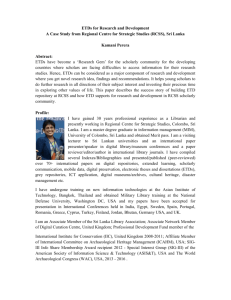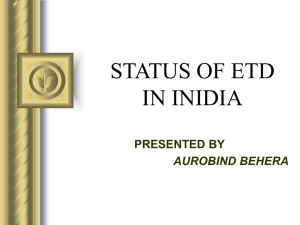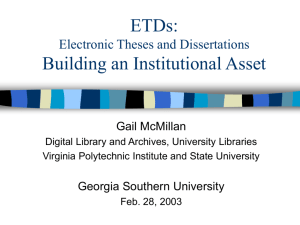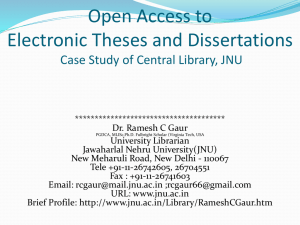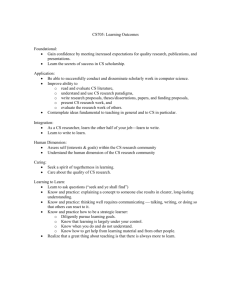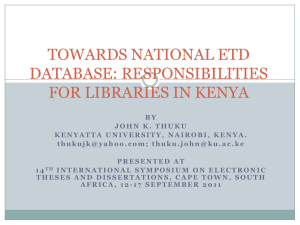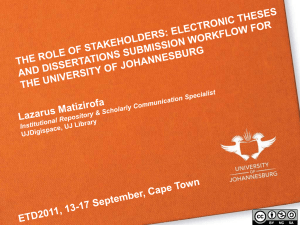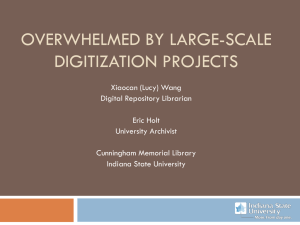Embargoes and ETDs
advertisement
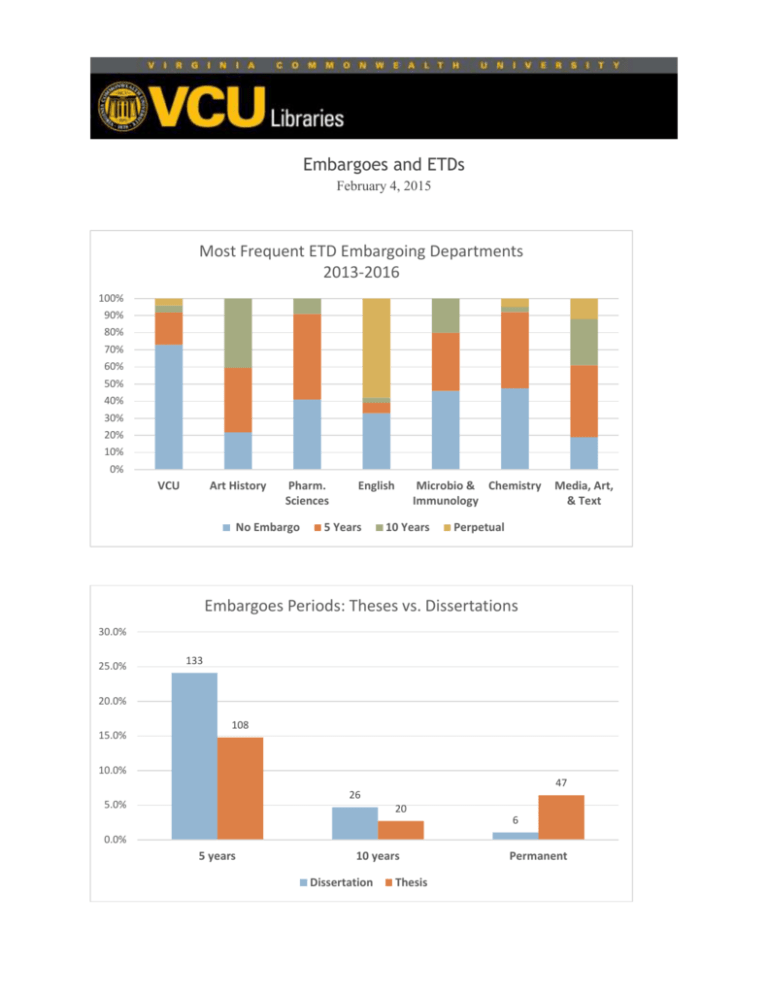
Embargoes and ETDs February 4, 2015 Most Frequent ETD Embargoing Departments 2013-2016 100% 90% 80% 70% 60% 50% 40% 30% 20% 10% 0% VCU Art History Pharm. Sciences No Embargo English 5 Years Microbio & Chemistry Immunology 10 Years Media, Art, & Text Perpetual Embargoes Periods: Theses vs. Dissertations 30.0% 25.0% 133 20.0% 15.0% 108 10.0% 47 26 5.0% 20 6 0.0% 5 years 10 years Dissertation Thesis Permanent Embargoes and ETDs February 4, 2016 Embargo History: Theses vs. Dissertations 300 250 200 150 100 50 - 2013 2014 Dissertations 2015 Theses Departments with at least one perpetual embargo: 19: English; 18: Creative Writing; 3: Media, Art, & Text, 2: Chemistry, Fine Arts/Sculpture, Theatre; 1: Biochemistry, Fine Arts/Fibers, Mathematical Sciences, Rehabilitation & Movement Science, Sociology, Theatre Departments with no embargoes: Accountancy, Accounting, Art Education, Chemical Physics, Clinical Laboratory Sciences, Counseling Psychology, Craft/Material Studies, Design, Education, Fine Arts, Fine Arts Ceramics, Fine Arts - Furniture design, Fine Arts - Jewelry and metalworking, Fine Arts - Kinetic imaging, Fine Arts - Painting, Fine Arts - Photography and film, Fine Arts - Printmaking, Graphic Design, Health Psychology, Health Related Sciences, Health Services Organization and Research, Interdisciplinary Art, Interdisciplinary Studies, Interior Design, L. Douglas Wilder School of Government and Public Affairs, Management, Mass Communications, Medical Physics, Medicinal Chemistry, Nanoscience and Nanotechnology, Occupational Therapy, Orthodontics, Painting & Printmaking, Pediatric Dentistry, Periodontics, Pharmaceutics, Pharmacy, Photography & Film, Political Science & Public Administration, Radiation Oncology, Rehabilitation Counseling, Sculpture + Extended Media, Social Work, Social Work, Ph.D., Special Education, Statistics, Systems Modeling and Analysis, Visual Communication Design Electronic Theses and Dissertations (ETD) information: http://www.library.vcu.edu/research/#theses VCU Graduate School manual: http://www.graduate.vcu.edu/media/graduate-school/docs/pdf/ThesisandDissertationManual.pdf VCU theses and dissertations manual: “Typical reasons for selecting a delayed release of the ETD include proprietary work and future publishing rights. Based on the justification provided, the Graduate School reserves the right not to accept the embargo terms.” Page 2 | 7 Embargoes and ETDs February 4, 2016 Recent Literature “American Historical Association Statement on Policies Regarding the Embargoing of Completed History PhD Dissertations” (AHA Blog, July 22, 2013) http://blog.historians.org/2013/07/american-historical-association-statement-on-policiesregarding-the-embargoing-of-completed-history-phd-dissertations/ The American Historical Association strongly encourages graduate programs and university libraries to adopt a policy that allows the embargoing of completed history PhD dissertations in digital form for as many as six years. However, online dissertations that are free and immediately accessible make possible a form of distribution that publishers consider too widespread to make revised publication in book form viable. History has been and remains a book-based discipline, and the requirement that dissertations be published online poses a tangible threat to the interests and careers of junior scholars in particular. “Can't Find It, Can't Sign It: On Dissertation Embargoes” (Harvard University Press Blog, July 26, 2013) http://harvardpress.typepad.com/hup_publicity/2013/07/cant-find-it-cant-sign-it-ondissertation-embargoes.html HUP Assistant Editor Brian Distelberg, for instance, notes how a project’s discoverability can be the means by which his interest is sparked: “I’m always looking out for exciting new scholarship that might make for a good book, whether in formally published journal articles and conference programs, or in the conversation on Twitter and in the history blogosphere, or in conversations with scholars I meet. And so, to whatever extent open access to a dissertation increases the odds of its ideas being read and discussed more widely, I tend to think it increases the odds of my hearing about them.” Cohen, Noam, “Historians Seek a Delay in Posting Dissertations” (New York Times, July 28, 2013) http://www.nytimes.com/2013/07/29/business/media/historians-seek-a-delay-in-postingdissertations.html?_r=0 “If you want tenure at a university, you have to publish a book,” [graduate student Michael Hattem] said. “It’s professional currency.” [Peter M. Berkery Jr., the executive director of the Association of American University Presses,] said he spoke to 15 heads of university presses, and “I haven’t found one person who has said if it is available open access, we won’t publish it.” Citing his own experience at Oxford University Press, he said that a book was necessarily an entirely different work from the dissertation that laid its groundwork, and is judged on its own terms. Hawkins, Ann R., Miles A. Kimball, Maura Ives, ‘Mandatory Open Access Publishing for Electronic Theses and Dissertations: Ethics and Enthusiasm” (Journal of Academic Librarianship 39:1, Jan. 2013, p.32-60) http://www.sciencedirect.com/science/article/pii/S0099133313000025 This article argues against policies that require students to submit theses and dissertations to electronic institutional repositories. The article counters a variety of arguments often used to justify this practice. In addition, the article reports on the results of an examination of electronic thesis and dissertation policies at more than 150 university libraries and graduate schools, offering a system of criteria and scoring for ranking these policies according to their respect for student copyright and intellectual property. Page 3 | 7 Embargoes and ETDs February 4, 2016 Jaschik, Scott, “Embargoes for Dissertations?” (Inside Higher Ed, July 24, 2013) https://www.insidehighered.com/news/2013/07/24/historians-association-faces-criticismproposal-embargo-dissertations The statement contains some phrases -- such as "history has been and remains a book-based discipline" -- that were infuriating to those trying to promote digital scholarship and nontraditional forms of disseminating knowledge. Some historians posting on the association website defended the new policy, and said that they objected to university rules requiring them make their dissertations public online -- especially if doing so would upset publishers. McMillan, Gail, Shannon Stark, and Martin Halbert, “2013 Baseline ETD Survey Data Analysis,” (preliminary draft, 2014?) http://www.metaarchive.org/public/resources/imls/NDLTD_Baseline_ETD_Survey.pdf These extracts are from the 2013 Networked Digital Library of Theses and Dissertations survey of 161 institutions active in managing ETDs. 29 (27%) of the responses are from international institutions and the remaining 132 (73%) responses are from the United States. A follow-up survey was conducted in the spring of 2015, but the results are not available yet. Another kind of restricted access is embargoing, which we defined as withholding an ETD from all access. When asked if institutions embargoed ETDs, only one international institution and one US institution responded that they embargoed all their ETDs. Yet twice as many international institutions reported that they did NOT embargo any ETDs, 8 vs. 4. … Figure 12. ETD Embargoes by Geographic Location Embargo periods vary, with 85% reported embargoing ETDs for more than one year. Page 4 | 7 Embargoes and ETDs February 4, 2016 Figure 13. Embargo Periods by Geographic Location Reasons for embargoing ETDs also varied. The chart below on the next page documents these based on 163 comments from 136 US institutions and 27 international institutions. No international institutions gave faculty concerns as a reason to embargo ETDs. However, they were far more concerned about sensitive or confidential information in ETDs than were the American survey respondents. Unlike the reasons for limiting access to the home institution, none mentioned institution-wide mandates for embargoing ETDs. Figure 14. Reasons for Embargos by Geographic Location Page 5 | 7 Embargoes and ETDs February 4, 2016 The general comments from American institutional representatives focused on 3 themes: embargoes (24%), digitizing (12%), ProQuest (22%). Other comments were on a wide variety of topics including the format of supplemental materials accompanying ETDs. The only overlap international comments had with US comments were on the topic of embargoes (33% international; 27% All). Patton, Stacey, “Scholarly Group Seeks Up to 6-Year Embargoes on Digital Dissertations” (Chronicle of Higher Education, July 24, 2013) https://chronicle.com/article/Scholarly-GroupSeeks-Up-to/140515/ Jacqueline Jones, vice president of the association's professional division and a professor of history at the University of Texas at Austin, says that extending an embargo can be beneficial because it gives new Ph.D.'s more time to revise a dissertation into a publishable monograph. Students can fine-tune their work by excising some material, incorporating new archival findings, and further developing their arguments in a style and tone that can resonate with a wider audience. The critics also argue that, by putting the printed book on a pedestal at a time when research is taking many other forms, the association is marginalizing historical research. Meanwhile, there's a standoff between the competing priorities of university presses, libraries, and hiring, tenure, and promotion committees. Graduate students are caught in the middle or are being used as proxies in debates over scholarly publishing, they say. Ramirez, Marisa L., Joan T. Dalton, Gail McMillan, Max Read, and Nancy H. Seamans, “Do Open Access Electronic Theses and Dissertations Diminish Publishing Opportunities in the Social Sciences and Humanities? Findings from a 2011 Survey of Academic Publishers.” (College & Research Libraries, July 2013) http://crl.acrl.org/content/74/4/368.full.pdf This study investigated social sciences, arts, and humanities journal editors’ and university press directors’ attitudes toward ETDs. The findings indicate that manuscripts that are revisions of openly accessible ETDs are always welcome for submission or considered on a case-by-case basis by 82.8 percent of journal editors and 53.7 percent of university press directors polled. Only 4.5 percent of all respondents indicated that they would never consider an ETD for publication. Nonetheless, our study does seem to indicate that the “smaller” university presses and journals may view ETDs as a threat to their bottom line … Additionally, university presses and journals in the literature field may be less inclined to consider a work derived from an ETD. Smith-Cruz, Shawn(ta), “Dissertation Dilemma: To Embargo or Not to Embargo?” (Graduate Center Library Blog, September 22, 2014) http://gclibrary.commons.gc.cuny.edu/2014/09/22/dissertation-dilemma/ [Audi recording excerpts from a conference at City University of New York, May 1, 2014. The full conference is available at http://videostreaming.gc.cuny.edu/videos/video/1607/, starting at about the 40 minute mark.] [An] event that tackled the question of whether making a dissertation open access affects the author’s ability to publish the work as a book. Page 6 | 7 Embargoes and ETDs February 4, 2016 Thomas, William Joseph, Cynthia Shirkey, “The Continuing Cautionary Tale of Creative Writing ETDs” (North Carolina Libraries 71:1, 2013) http://www.ncl.ecu.edu/index.php/NCL/article/viewFile/357/472 Electronic theses and dissertations (ETDs) often spark debate regarding restrictions on access and students’ opportunities for later publication. Most other studies have found publishers are in fact willing to work with submissions based on open access ETDs, but these studies have been conducted broadly on scholarly journals across a variety of disciplines rather than focusing specifically on creative writing. Librarians from East Carolina University identified a group of creative writing publishers and surveyed them to determine their attitudes towards manuscript submissions from ETDs, embargoes, and restrictions on access. Survey respondents by and large view open access ETDs as prior publications, although many are still willing to work with authors on an individual basis. The authors discuss the continued importance of offering creative writers options for restricted access and/or embargoes while publishers and creative writers work out the place of ETDs in the publishing chain. One thing is clear: for the time being, libraries must continue to offer closed access to electronic theses. While publisher and writer attitudes evolve on the topic, allowing some sort of closed access option satisfies the “no prior publication” rule of the majority of the publishers queried. Page 7 | 7
